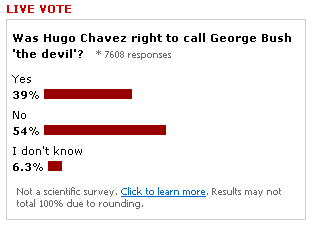
From a recent Newsweek poll.
[I]t may be that all mental illness is not caused by demons... but that doesn’t mean none is either.... How explanatory is this ansatz after all? At this point it’s a wash... who is struck by illness is on the one hand under the purview of Dame Chance... the other, unseen agents. Inasmuch as neither has any explanatory powers whatsoever it's something of a wash.Answering my hypothetical, he continues in this vein:
How do you respond when he says that he actually has three PCs side by side, and that he and his two other triplets always visit the same web sites at (just about) the same time, but only his got infected. His explanation is that his was infected because there was only one demon, you mumble things about packet timing, vagaries of Internet switches and fluctuations in viral signature databases residing in corporate firewalls... but why is your explanation any better than his? Ultimately your explanation is that “it’s just luck”. Pray tell, how your explanation is better?Note the false either-or offered: either demon possession or chance. Compare that with other possibilities, which I thought of in thirty seconds:
1. Demon possession as an accident. Demons, like viruses, infect random people, and spiritual justifications for their behavior are ad hoc.It should be obvious by now that the ultimate explanation doesn't interest me; I'm concerned with the proposition "a demon possessed me / my computer / my dog / the demon that possessed my dog." But let's grant it, for the sake of argument, and say that yes, "it's just luck," and that science can't ultimately explain the metaphysical final cause of the computer's aberrant behavior. The first question is, "So what?" We've shown a plausible and highly probable mechanism that accounts for the behavior. We can even run an experiment, re-infecting the computer with a virus, or infecting a different computer with the virus and watching what happens. At the end of our investigation we won't rule out the possibility of demonic infestation, but we'll certainly show that bringing in demons adds nothing to the discussion. We'll have a testable, falsifiable hypothesis, one that we can abandon when compelling contrary evidence presents itself.
2. Demon possession as the will of God. Demons attack at God's behest, or, at least, with God's permission; if God's will is utterly inscrutable, the epistemological distinction between Divine Plan and Chance is impossible.
3. Mental illness as God's punishment, not involving any intermediate spiritual or physical entity. This position would line up with Olson's cited passage from Jacob Milgrom's Leviticus. Olson counters with commitments to other Biblical authors and thinkers who take demons "literally," which of course begs the question, since the rationality of that very position is under scrutiny.
1. The Church has a high bar for what constitutes actual possession, including genuinely inexplicable phenomena (speaking in a language one has never learned, for example).Which brings me to Olson's second line of argument: putative evidence for the reality of malignant forces. If I were to append my hypothetical to match the current state of affairs in demonological study, the virus would cause the computer to spit out passwords and usernames from the future (as in Olson's addendum), but only when no skeptic is watching. The most evenhanded treatment of exorcism I've read, Michael Cuneo's American Exorcism, reports a lot of vomiting and profanity in the spirit world, but decidedly little in the way of supernatural activity. In the middle of an exorcism, believers would ask Cuneo, "Did you see that?" Sadly, he never did.
2. Anneliese Michel's case intially cracked its skull on that bar (some weird voices, contortions, self-destructive behavior, but no spiritual theatrics, nothing "impossible").
3. When the Church got around to dealing with the case, it was an exorcism in futility (couldn't resist).
Michel was raised in a strict Catholic family in Bavaria, which rejected the reforms of Vatican II and flirted with religious fringe groups. While other kids her age were rebelling against authority and experimenting with sex, she tried to atone for the sins of wayward priests and drug addicts by sleeping on a bare floor in the middle of winter.In most possession stories I've read, victims are those who experiment with the occult, dabble with ouija boards, attend seances, read horoscopes, listen to heavy metal. As Bob Larson, one of the U.S.'s premiere demonologists* puts it, "Generally, the person who has a demon knows he has serious spiritual problems that have defied all of his efforts to rectify."
Sometimes the demons identified themselves -- as Cain, Nero, Judas, Lucifer, Hitler and others -- and even answered the exorcists' questions, explaining what was wrong with the church or why they were in Hell. "People are stupid as pigs," spat Hitler. "They think it's all over after death. It goes on." Judas said Hitler was nothing but a "big mouth" and had "no real say" in Hell.Absent the physical violence and bizarre behaviors--which were likely exacerbated by her parents' refusal to allow sedation--the thought of bickering spirits is comical. It should be noted that the Catholic church refused to perform an exorcism for several years, because Michel did not show the hallmark signs of possession, including speaking in a language she had never learned. (The film shows Emily Rose speaking Latin, and acknowledges, if I remember correctly, that Rose, like Michel, learned Latin in school.)